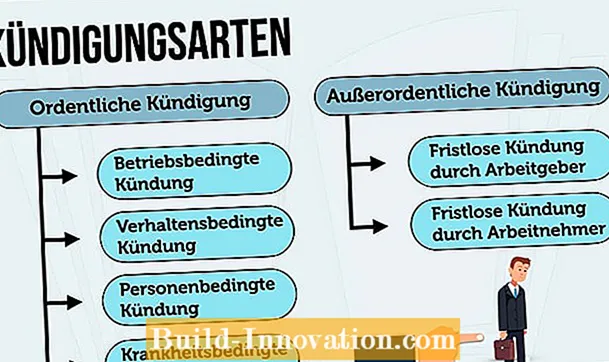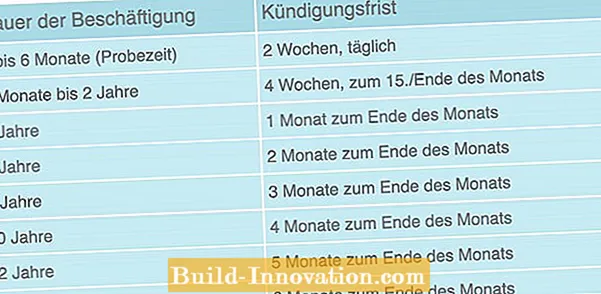Behavioral termination: requirements, deadlines, consequences

Content
- What is behavioral termination?
- Types of termination
- Behavioral termination possible without warning?
- Permissible reasons for termination and KSchG
- 1. Termination due to breach of duty (service area)
- 2. Termination due to breach of trust (trust area)
- 3. Termination due to disruptions in operational order
- Conditions for a conduct-related termination
- Breach of contract
- Applicability of the Employment Protection Act
- Proportionality
- Balancing of interests
- works Council
- Deadlines for behavior-related termination
- Is a conduct-related termination without notice?
- Behavioral Termination Pattern: Editable Template
If the employee violates his duties in the employment relationship or if he commits a serious breach of trust, the employer can terminate him due to behavior. Typical reasons are regular delays, refusal to work, insults or theft. The behavior-related termination must, however, meet numerous requirements in order to be legally effective. We show which reasons for termination are permissible, which deadlines must be observed and how you can defend yourself against a behavior-related termination ...
What is behavioral termination?
A conduct-related termination is only permissible in the event of serious misconduct by the employee. This essentially includes three areas:
- Disturbances in the power range (serious breach of duty, behavior contrary to contract)
- Disturbances in the trust area (Breach of trust, e.g. theft, working time fraud, expense fraud)
- Disruptions of the business peace
It must be a controllable behavior. Means: The employee has deliberately decided against the fulfillment of his contractual obligations. He can therefore be accused of wrongdoing. Incidentally, this does not apply to dismissal due to illness, because there is no culpable behavior.
Types of termination
Around every fourth employee (24.4 percent) loses their job due to misconduct. The behavioral termination is the second most common reason for termination. The form of termination itself belongs to the group of ordinary terminations - such as operational or personal termination. Means: The employer must comply with statutory (and contractual) notice periods and provide evidence of a permissible reason for termination. Otherwise the expulsion is ineffective.

Behavioral termination possible without warning?
In order for the behavior-related termination to be effective, the employer must first issue a warning (LAG Hamm, Az. 7 Sa 2/12). The employee should be given a chance to recognize his misconduct and the disapproval of the boss and to correct his actions. In contrast to the termination, the employer can "only" issue the warning orally. And: no rule without exceptions.
A behavior-related termination is also possible without a warning. According to the Federal Labor Court, the warning can be waived if ...
- it is a particularly serious breach of duty (duties of care and loyalty) and disturbances in the area of trust.
- It can be assumed that the employee will not change his behavior even after the warning.
In both cases, the employer cannot be expected to continue the employment relationship. The consequence of this is that the behavior-related termination also becomes a termination without notice.
Permissible reasons for termination and KSchG
If the company regularly employs more than ten people, statutory protection against dismissal applies. According to the Dismissal Protection Act (KSchG), employers are then no longer allowed to terminate their employees for no reason, but must instead state the reason for termination and, if in doubt, be able to prove it in court. As mentioned above, a distinction is made between three areas of permissible reasons for termination:
1. Termination due to breach of duty (service area)
In this case, the employee violated his main or secondary obligations under the employment contract with his behavior or did not work properly, although he could. Examples:
- Refusal to work (Failure to perform or ignore instructions, LAG Hamm, Az. 7 Sa 2/12)
- Come too late or go too early (regularly), unexcused absence (BAG, Az. 2 AZR 604/90)
- Minus hours (Too many accumulation, LAG Mecklenburg-Western Pomerania, Az. 5 Sa 219/14)
- Underperformance (sloppy, faulty or too slow work)
- Private use from the Internet, work cell phone or e-mail (BAG, Az. 2 AZR 581/04)
- Assaults to superiors or colleagues (LAG Mainz, Az. 5 Sa 433/13)
- Defamation and damage to the employer's reputation
- Self-leave (Take vacation or extend it without permission)
2. Termination due to breach of trust (trust area)
In this case, the employee's behavior destroys the necessary basis of trust for the cooperation and the employment relationship. The employer can in principle expect loyalty and honesty. If the trust is destroyed, an extraordinary termination (without notice) is possible. Examples:
- Working time fraud (e.g. handling of private matters during working hours)
- insult from superiors, colleagues or customers
- theft (Regardless of whether it is rolls or paper clips, BAG, Az. 2 AZR 541/09)
- Scam (Buddy punching, expense fraud, embezzlement)
- Celebrating sick (Also just the announcement! BAG, Az. 2 AZR 251/07)
- Competitive activity (for a competitor to the disadvantage of the employer, LAG Hessen, Az. 21 Sa 850/12)
- Industrial espionage (Disclosure of trade secrets)
3. Termination due to disruptions in operational order
In these cases, the misconduct towards superiors, colleagues or customers has a massive and lasting effect on the peace of the company. Examples:
- Sexual harassment (BAG, Az. 2 AZR 323/10)
- mobbing and Bossing (LAG Sachsen-Anhalt, Az. 9 Sa 473/99)
- Alcohol consumption at the workplace despite the ban on alcohol (BAG, Az. 2 AZR 649/94)
- Smoke despite the smoking ban
- Substance abuse (or drug trafficking)
- Violation of security regulations (and endangering others)
- Violation of compliance guidelines
Conditions for a conduct-related termination
For a behavior-related termination to be effective, not only must there be recognized reasons, but several prerequisites and conditions must also be met:
-
Breach of contract
The employee has not performed the contractually agreed services or has not complied with the employer's right to direct, although the opportunity to do so existed.
-
Applicability of the Employment Protection Act
The statutory protection against dismissal only begins when the employment relationship has existed for at least six months (so-called "waiting period"). Before this - usually during the probationary period - both parties can terminate the contract without giving reasons and within two weeks.
-
Proportionality
In principle, termination is the last resort - the “ultima ratio”. However, the employer must first check whether there are also milder means of sanctioning: admonition or warning, transfer or notice of change. A behavior-related termination is only possible when all alternatives can be ruled out.
-
Balancing of interests
In the case of behavior-related termination, the employer's interest in the dismissal must outweigh the employee's interest in continued employment. This is the case if there is a risk of repetition (so-called "negative prognosis") or the misconduct was particularly serious. However, it must also be taken into account whether there are exonerating circumstances. Likewise, the length of service and previous cooperation and quality of work as well as social hardship (children, maintenance obligations) must be weighed up.
-
works Council
If there is a works council in the company, it must be informed and consulted prior to any dismissal in accordance with Section 102 of the Works Constitution Act (BetrVG). He can express concerns about the termination within three days - in writing. If the works council is not fully informed of the planned termination and the reasons for termination, the termination is ineffective.
Deadlines for behavior-related termination
The statutory notice periods also apply to behavior-related termination - with the exception of extraordinary termination without notice for particularly serious reasons. Longer periods can also be agreed in the employment contract or collective bargaining agreement. According to Section 622 of the German Civil Code (BGB), Paragraph 2, the statutory periods extend with the length of the employee's employment. The maximum notice period for employers is seven months (after 20 years of service):

Is a conduct-related termination without notice?
As a rule, a behavior-related termination is a timely, ordinary termination. However, employers may also terminate the contract without notice for “good cause”. There are important reasons if the employment relationship is so stressed that continued employment would be unreasonable for the employer.
Behavioral Termination Pattern: Editable Template
You can edit, individually adapt and copy the following sample letter of termination for a behavior-related termination right here online and in the browser. Simply click on the box.
Employer GmbH
Name of the beneficiary
address
Postal code and city
First and last name of the employee
Personnel number
address



